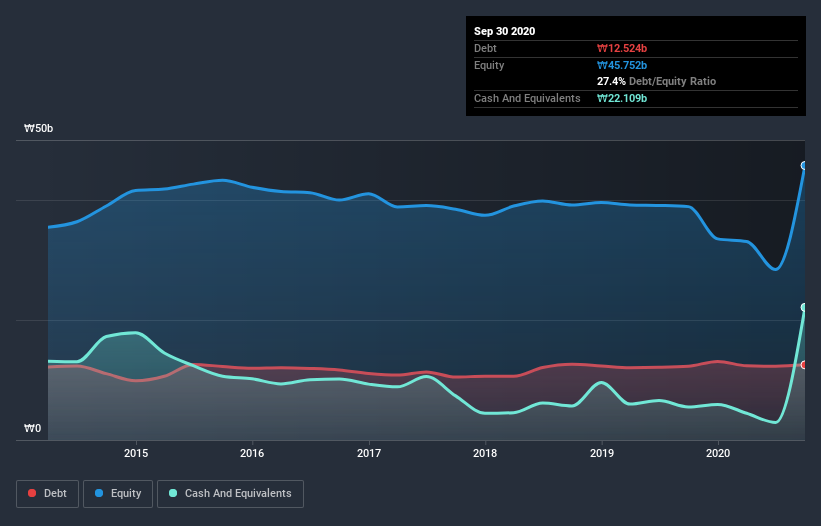The external fund manager backed by Berkshire Hathaway's Charlie Munger, Li Lu, makes no bones about it when he says 'The biggest investment risk is not the volatility of prices, but whether you will suffer a permanent loss of capital.' So it seems the smart money knows that debt - which is usually involved in bankruptcies - is a very important factor, when you assess how risky a company is. As with many other companies KNW Co., Ltd. (KOSDAQ:105330) makes use of debt. But the more important question is: how much risk is that debt creating?
When Is Debt A Problem?
Debt assists a business until the business has trouble paying it off, either with new capital or with free cash flow. If things get really bad, the lenders can take control of the business. However, a more common (but still painful) scenario is that it has to raise new equity capital at a low price, thus permanently diluting shareholders. Of course, the upside of debt is that it often represents cheap capital, especially when it replaces dilution in a company with the ability to reinvest at high rates of return. When we examine debt levels, we first consider both cash and debt levels, together.
View our latest analysis for KNW
What Is KNW's Net Debt?
The chart below, which you can click on for greater detail, shows that KNW had ₩12.5b in debt in September 2020; about the same as the year before. However, its balance sheet shows it holds ₩22.1b in cash, so it actually has ₩9.58b net cash.

A Look At KNW's Liabilities
Zooming in on the latest balance sheet data, we can see that KNW had liabilities of ₩27.6b due within 12 months and liabilities of ₩6.84b due beyond that. On the other hand, it had cash of ₩22.1b and ₩25.3b worth of receivables due within a year. So it actually has ₩13.0b more liquid assets than total liabilities.
It's good to see that KNW has plenty of liquidity on its balance sheet, suggesting conservative management of liabilities. Because it has plenty of assets, it is unlikely to have trouble with its lenders. Simply put, the fact that KNW has more cash than debt is arguably a good indication that it can manage its debt safely. When analysing debt levels, the balance sheet is the obvious place to start. But you can't view debt in total isolation; since KNW will need earnings to service that debt. So if you're keen to discover more about its earnings, it might be worth checking out this graph of its long term earnings trend.
Over 12 months, KNW made a loss at the EBIT level, and saw its revenue drop to ₩60b, which is a fall of 43%. That makes us nervous, to say the least.
So How Risky Is KNW?
By their very nature companies that are losing money are more risky than those with a long history of profitability. And the fact is that over the last twelve months KNW lost money at the earnings before interest and tax (EBIT) line. And over the same period it saw negative free cash outflow of ₩5.0b and booked a ₩13b accounting loss. But the saving grace is the ₩9.58b on the balance sheet. That kitty means the company can keep spending for growth for at least two years, at current rates. Even though its balance sheet seems sufficiently liquid, debt always makes us a little nervous if a company doesn't produce free cash flow regularly. The balance sheet is clearly the area to focus on when you are analysing debt. But ultimately, every company can contain risks that exist outside of the balance sheet. For instance, we've identified 4 warning signs for KNW (2 don't sit too well with us) you should be aware of.
When all is said and done, sometimes its easier to focus on companies that don't even need debt. Readers can access a list of growth stocks with zero net debt 100% free, right now.
If you decide to trade KNW, use the lowest-cost* platform that is rated #1 Overall by Barron’s, Interactive Brokers. Trade stocks, options, futures, forex, bonds and funds on 135 markets, all from a single integrated account. Promoted
Valuation is complex, but we're here to simplify it.
Discover if KNW might be undervalued or overvalued with our detailed analysis, featuring fair value estimates, potential risks, dividends, insider trades, and its financial condition.
Access Free AnalysisThis article by Simply Wall St is general in nature. It does not constitute a recommendation to buy or sell any stock, and does not take account of your objectives, or your financial situation. We aim to bring you long-term focused analysis driven by fundamental data. Note that our analysis may not factor in the latest price-sensitive company announcements or qualitative material. Simply Wall St has no position in any stocks mentioned.
*Interactive Brokers Rated Lowest Cost Broker by StockBrokers.com Annual Online Review 2020
Have feedback on this article? Concerned about the content? Get in touch with us directly. Alternatively, email editorial-team (at) simplywallst.com.
About KOSDAQ:A105330
KNW
Manufactures and sells high-tech materials for display industry and materials of automobile components in South Korea.
Imperfect balance sheet with minimal risk.
Market Insights
Community Narratives



